About us
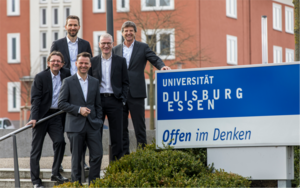
With more than 274,0000 students in more than 600 courses of study at 22 universities, the Ruhr area is one of the densest but also youngest educational landscapes in Europe. As part of this educational landscape, we have been researching and teaching the possible uses of information technology in companies for over twenty years with over 30 employees in five research groups. We are supported by over 20 other research groups that conduct research and teach in the fields of business administration, economics and computer science. In addition to organisational questions on the strategic orientation of IT and the possibilities of decision support, our research also addresses technical topics that deal with the implementation and integration of operational information systems. In addition, we also offer our more than 1,400 students skills for setting up companies, so that our research and graduates will continue to help organizations safely into a digital future in the future.
Prof. Dr. Frederik Ahlemann
Chair of Information Systems and Strategic IT Management
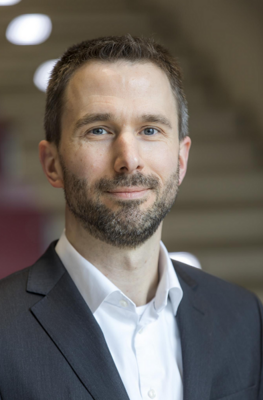
What is the focus of your chair's work?
In our research we are dedicated to the strategic IT management of organizations. On the one hand, this includes the development and evaluation of process models, methods and tools (so-called artifacts) which support the successful management of IT. On the other hand, we investigate the behavior of and effects on people interacting with these artifacts. We work closely with leading companies to ensure the applicability and sustainable benefit of our research results.
What is your current research project?
The chair is continuously working on several research projects in the field of strategic IT management, often in cooperation with practical partners. For example, in our research project "Methodology Acceptance" we investigate user behavior to identify aspects that lead to acceptance or rejection of IT project management methods. The starting point for this is the fact that many standardized methods are often not used in the intended way and the benefit hoped for by the introduction is therefore difficult to prove.
Why can you recommend the study of BIS at the UDE to prospective students?
The University of Duisburg-Essen offers an excellent environment for studying Business Information Systems. In the course of its studies, the University of Duisburg-Essen thus positions itself as a strong location for the interdisciplinary training of highly qualified specialists and managers for IT management.
Prof. Dr. Stefan Eicker
Chair of Information Systems and Software Engineering
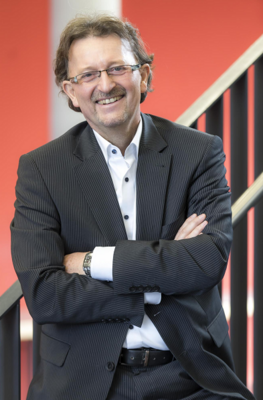
What is the focus of your chair's work?
The chair of Business Information Systems and Software Engineering focuses on the training of business computer scientists in the basic area as well as on the transfer of sound knowledge in the areas of software engineering, in particular software architectures, patterns, Internet technologies and development processes. The students learn to evaluate and acquire technological developments. It does not take the perspective of a programmer or technology expert, but promotes the innovation and management perspective, which focuses on the value-creating processes of an organization.
In its work, the chair combines scientifically sound content with extensive practical experience in order to prepare business IT specialists in a target-oriented manner for the professional field. The creation of optimal teaching and learning conditions through innovative and goal-oriented event design has priority. For example, the module "Introduction to Business Information Systems" was awarded the prize for innovation in teaching practice at the UDE. We also regularly offer study projects with real companies/customers.
Which current research projects are you currently working on?
In its research, the chair is currently focusing on the challenges associated with digital transformation and investigating the opportunities offered by digital change for companies. It is crucial to understand the forthcoming changes and backgrounds, to apply digital innovations in one's own professional everyday life and to transform entire companies digitally. Within the scope of the research activities, a further education concept "Digital Transformation" was developed, which received the further education award of the Ruhr Campus Academy (RCA) in 2015.
Why can you recommend the study of BIS at the UDE to prospective students?
Due to the heterogeneous orientation of WI, the University of Duisburg-Essen offers students a competitive advantage in both research and teaching. The wide range of courses on offer promotes the professional qualifications and the research activities of the professors motivate a possible academic career. The integration of IT and business management services into the WI curriculum also enables students to orientate themselves individually in line with their own interests and objectives.
Prof. Dr. Ulrich Frank
Chair of Information Systems and Enterprise Modelling

What is the focus of your chair's work?
Our research is aimed at making decision-making and action complexes in organizations more efficient through the use of information and communication technology. To this end, we concentrate our work primarily on the development and testing of methods for multi-perspective business modeling. We combine a high scientific standard with a pronounced application orientation. Our projects are supported by the German Research Foundation, the Federal Ministry of Education and Research and the European Union, among others, and we also maintain intensive cooperation with companies.
Which research projects are you currently working on?
With the project Language Engineering for Multilevel Modeling we are developing a new generation of modeling languages and tools together with Prof. Tony Clark from the University of Sheffield. In contrast to other modeling approaches, we overcome the strict dichotomy of model and modeling language. Rather, our approach allows a variety of integrated modeling levels and the creation not only of models, but also of modeling concepts at runtime. At the same time, the recursive and reflective language architecture is integrated with a corresponding (meta) programming language. This makes it possible to solve the notorious problem of synchronizing models and code in an extremely elegant way: There is a common representation of code and model. This enables a new generation of business software, which we call "self-referential": A software system is integrated with conceptual models of itself and the company in which it is used.
Why can you recommend the study of BIS at the UDE to prospective students?
First of all, it is generally true that studying Business Information Systems opens up a fascinating perspective: Ultimately, it is about not only understanding the gigantic transformation that societies around the world are undergoing, but actively helping to shape it. The particular strength of our Business Information Systems programs here in Essen lies in the fact that we not only take a differentiated view of the economic aspects of such a transformation, but also convey the competence required to design and implement software systems. The study conditions are adapted to the complex matter: The contents of the course are less focused on concrete technologies, as these are subject to rapid change. Rather, we teach students concepts and methods that will enable them to meet the challenges of digital change professionally in the future as well.
It is very important to us to support our students comprehensively and to guarantee flexibility and topicality. Students receive a variety of multimedia teaching materials on current topics in Business Information Systems and international IS research. Our courses are characterised by a high degree of interaction, whereby direct contact with professors and scientific staff is not only possible but also desired. Last but not least, the internationalisation of our Master's programme offers an attractive perspective: students are thus specifically prepared for a more and more globalised labour market.
Prof. Dr. Tobias Kollmann
Chair of E-Business and E-Entrepreneurship
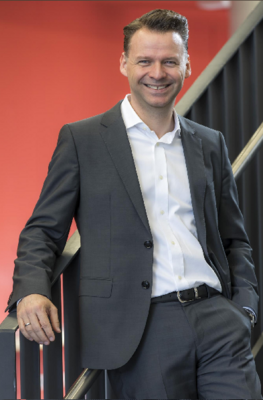
What is the focus of your chair's work?
The Chair of Business Administration and Information Systems, in particular e-business and e-entrepreneurship, pursues a special combination of education and business development in e-business through the special anchoring between an economic and technical teaching area.
On the one hand, the aim is to contribute to the intensification of the use of digital business processes with the courses offered (e-business). On the other hand, the focus is also on intensifying business start-ups in the net economy (e-entrepreneurship).
What is your current research project?
We are currently working on several projects that investigate the interaction of relevant factors from the entrepreneurial context (e.g. the effect of founder personality and other individual characteristics such as affect and environmental factors on organisational factors such as innovation).
Why can you recommend the study of BIS at the UDE to prospective students?
The University of Duisburg-Essen offers the unique opportunity to combine the skills and competences of several disciplines important for the information and communication technology (ICT) sector, namely business administration, Business Information Systems and computer science, and thus to stimulate and promote business start-ups and innovation activities in this field.
Prof. Dr. Reinhard Schütte
Chair of Information Systems and Integrated Information Systems
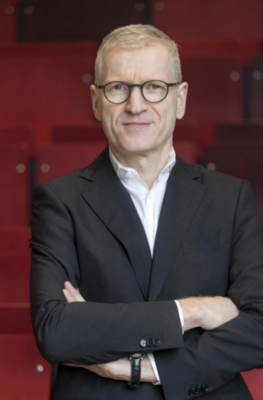
What is the focus of your chair's work?
The chair deals with the design of application systems and organizations, taking research findings into account. The work focuses on the core of the knowledge and design problem: How do IT systems in general and enterprise systems as a specific type of system in particular work in companies?
As part of our research and teaching efforts, we investigate the interdependencies between the organization and the application systems used. In this context, we deal with the concept of digitization and the associated opportunities and challenges for companies and especially for IT.
Which current research projects are you currently working on?
In its current research projects, the chair addresses the questions as to why instruments of information modeling, including enterprise architecture management, that are recognized in science play such a small role and which challenges greater transformation projects pose to IT management. The starting point is the fact that many companies are only unsatisfactorily implementing the alignment of business and IT strategy on the one hand and the transformation of IT systems on the other hand in the course of digitization.
Why can you recommend the study of BIS at the UDE to prospective students?
Business Information Systems at the University of Duisburg-Essen offers a wide range of topics and is excellently positioned in Germany in its combination with IT and business management offerings. The Business Information Systems professors offer scientifically ambitious courses, including courses in the theory of science, and combine this with an internationally oriented catalogue of topics that also takes practical problems into account.
